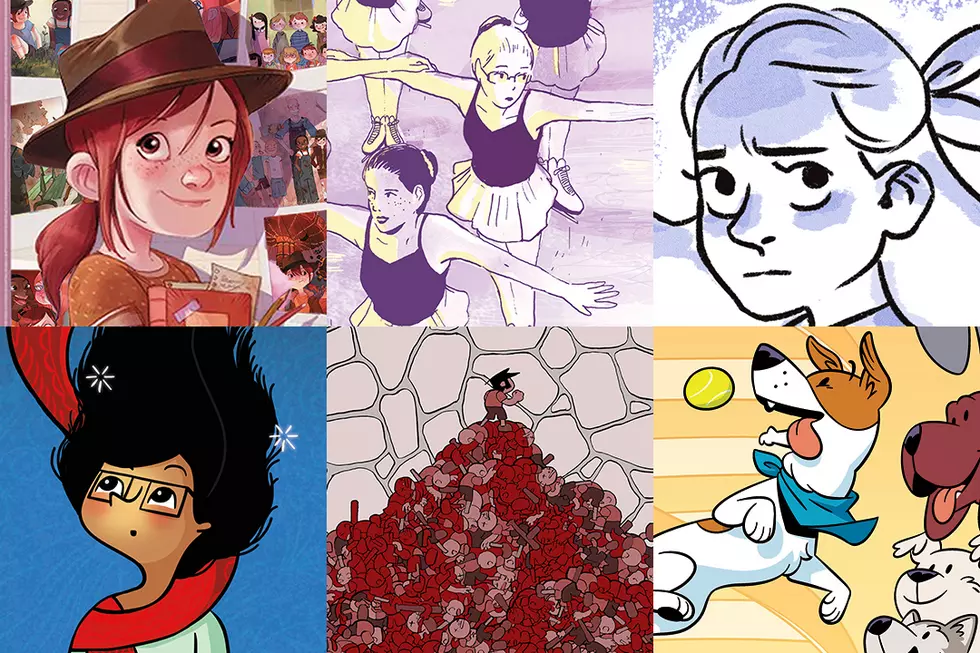
Reading with Mr. Ambassador: Gene Luen Yang Is First Graphic Novelist to Be Named National Ambassador for Young People’s Literature
The Library of Congress, the Children's Book Council, and Every Child a Reader announced this week that Gene Luen Yang has been appointed the fifth National Ambassador for Young People’s Literature. An Eisner Award winner for The Eternal Smile and American Born Chinese, a Printz Award winner for American Born Chinese, a two-time National Book Award Finalist for American Born Chinese and Boxers and Saints, and current writer of DC Comics’ Superman, Yang is the first graphic novelist to hold the post.
According to the Library of Congress, the National Ambassador is selected for “contributions to young people's literature, the ability to relate to kids and teens, and a dedication to fostering children's literacy as a whole.” Yang, a math teacher in addition to a comic book writer and artist, has long used his comics work for education. While in graduate school, he created an online comic, “Factoring with Mr. Yang and Mosely the Alien.”
Yang’s educational initiative as National Ambassador is called Reading Without Walls. Yang outlined its principles to ComicsAlliance. “We want kids --- everyone, really --- to read outside of their comfort zones. ... That means, One: Reading stories about people different from ourselves. Two: Reading about topics that we're unfamiliar with --- STEM, for example. Three: Reading stories in unfamiliar formats --- graphic novels, novels in verse, prose novels. It means exploring the world through reading.”
The choice of a graphic novelist as National Ambassador shows the increasing acceptance of comics in education. In 2014, the Library of Congress’ Young Readers Center hosted a panel on “reluctant readers” that explored a medium that is fast-growing in popularity with both young and adult readers. Yang’s selection is part of this acknowledgement of the important role graphic novels now have in young readers’ lives.
"Looking at the make-up of the selection panel, you have librarians, educators and booksellers --- a cross-section of people who are closely interacting with books and consumers of books,” said Karen Jaffe from the Library of Congress. “It certainly signals that graphic novels and writers of graphic novels can have a tremendous influence on young readers and in some cases can maybe make reading more interesting for young people who might not otherwise be drawn to books.”
Yang himself is both astounded and gratified by this shift in attitudes. “Who would've thought that this would even be possible when we were kids?” he said. “It means that graphic novels are now widely accepted as a vital part of young people's literature. I think educators and parents are finally waking up to the educational potential of comics. I hope that someday soon there will be an entire shelf devoted to educational comics at your local library and your local bookstore.”
While Yang added that using comics to engage reluctant readers is “a totally legit way of using comics," he added, "I hope that more and more educators will recognize comics as a medium worth of study in and of itself.”
So how did the new National Ambassador for Young People’s Literature spend his first official day on the job? In a Facebook post, he wrote, “Was able to spend a couple hours at my local library, dressed like a slob, sipping ginger tea out of a thermos, working on my latest Superman script. I'm thankful for that and everything else.”
More From ComicsAlliance

![Luthor Wants To Be Friends In ‘New Super-Man’ #9 [Exclusive Preview]](http://townsquare.media/site/622/files/2017/03/NSM_Featured.jpg?w=980&q=75)







